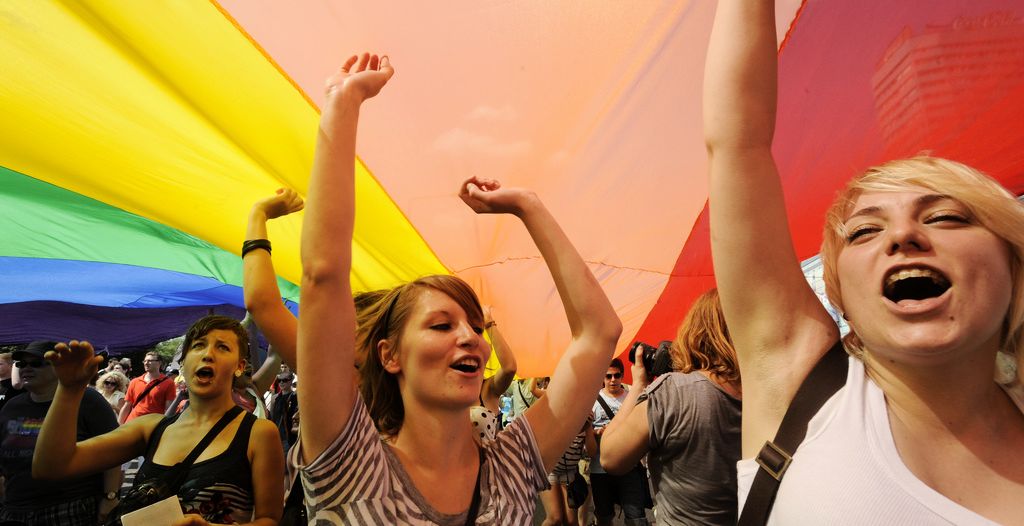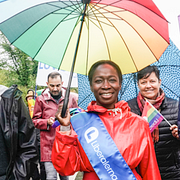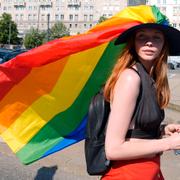
Hbtq-rörelsen trotsar hoten med rekord-Pride i Polen
Tusentals personer väntas fira Pridefestival på Polens gator under dagen trots ökade hot mot rörelsen, rapporterar AP.
Det polska regeringspartiet Lag och rättvisa har blivit allt hårdare i sin ton mot hbtq-rörelsen och sagt att den hotar traditionella värden. Partiets ledare Jaroslaw Kacynski kallade nyligen gayrörelsen för en utländsk importerad kraft som hotar Polens värden.
Runt om i Polen ska rekordmånga parader hållas – 20 stycken i olika städer – och på flera håll har borgmästare försökt stoppa firandet. I många fall hänvisas till säkerhetsrisker. I huvudstaden Warszawa väntas dock borgmästare Rafal Trzaskowski delta för första gången.
Läs mer
bakgrund
Hbtq-rättigheter i Polen
Wikipedia (en)
Lesbian, gay, bisexual, and transgender (LGBT) people in Poland face legal challenges not faced by non-LGBT residents. Both male and female same-sex sexual activity are legal in Poland. This was formally codified in 1932, and Poland introduced an equal age of consent for homosexuals and heterosexuals, which was set at 15. Poland provides LGBT people with the same rights as heterosexuals in certain areas: gay and bisexual men are allowed to donate blood, gays and bisexuals are allowed to serve openly in the Polish Armed Forces, and transgender people are allowed to change their legal gender following certain requirements including undergoing hormone replacement therapy. Polish law bans employment discrimination based on sexual orientation. No protections for education, health services, hate crimes and hate speech exist, however. In 2018, the Supreme Court ruled that it is illegal to deny goods and services on the basis of sexual orientation.
Polish society tends to be socially conservative with issues dealing with LGBT rights. A majority of the Polish population affiliate with the Catholic Church. As such, Catholic mores strongly influence public perception and tolerance of the LGBT community. Article 18 of the Polish Constitution states that "Marriage, as a union of a man and a woman [...] shall be placed under the protection and care of the Republic of Poland." This has led to different interpretations by individual lawyers as well as legal cases over whether or not the Constitution prohibits same-sex marriages. According to the dominant interpretation, this article bans same-sex marriage. The Supreme Court, the Constitutional Tribunal and the Supreme Administrative Court have ruled that Article 18 of the Constitution limits the institution of marriage to opposite-sex couples and thus marital rights for same-sex couples are not recognized nor endorsed in constitutional law. As such, any attempt to legalize same-sex marriage without an amendment to the Constitution would be unconstitutional in Poland. In January 2019, howewer, an administrative court in Warsaw ruled that the Polish Constitution does not explicitly ban same-sex marriage, but since the Warsaw Administrative Court does not possess the same level of authority regarding constitutional matters as the Supreme Administrative Court, the Constitutional Tribunal or the Supreme Court, it is not expected to meaningfully alter said constitutional provision. Poland does not recognise civil unions either, though discussion on this issue is ongoing.
Nevertheless, attitudes are evolving and becoming more accepting, in line with worldwide trends. In 2011, Anna Grodzka became the third transgender member of parliament in the world, following Georgina Beyer of New Zealand and Vladimir Luxuria of Italy. Additionally, in 2014, gay activist Robert Biedroń was elected the Mayor of Słupsk. Acceptance for LGBT people in Polish society increased in the 1990s and early 2000s, mainly amongst younger people and those living in larger cities such as Warsaw and Kraków. There is a visible gay scene with clubs all around the country, most of them located in the large urban areas. There are also several gay rights organizations, the two biggest ones being Campaign Against Homophobia and Lambda Warszawa. Opinion polls have shown that a majority of Poles now support civil unions for same-sex couples, limited legal rights such as inheritance and the right to make medical decisions, as well as the recognition of foreign same-sex marriages.Many left-wing political parties, namely the Democratic Left Alliance, Labour United, the Social Democracy Party, Your Movement, Modern, Together and Spring, have expressed support for the gay rights movement. Individual voices of support can also be found in the centre-right Civic Platform.
Omni är politiskt obundna och oberoende. Vi strävar efter att ge fler perspektiv på nyheterna. Har du frågor eller synpunkter kring vår rapportering? Kontakta redaktionen



